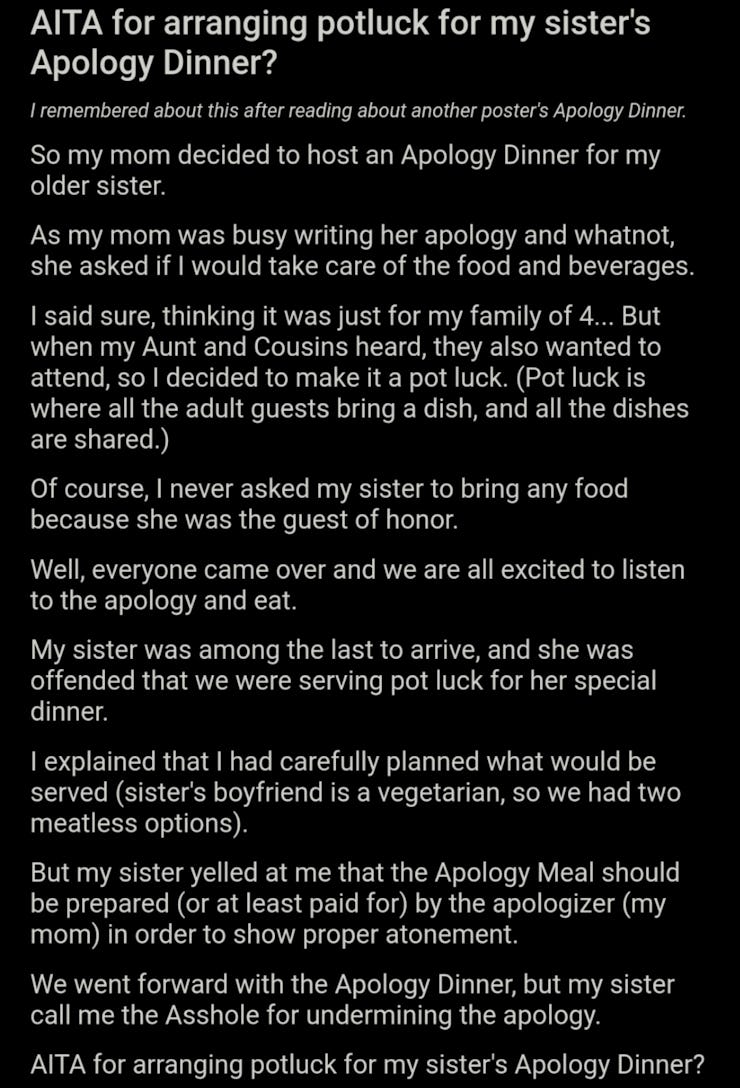The best apologies have these 4 elements, says a psychologist
Just saying "sorry" isn't enough.

This week a viral moment on the internet got me thinking about a fundamental but overlooked question: What is the best way to apologize?
The moment was a screenshot shared on Twitter from the Reddit page “Am I the asshole?” (AITA). The purpose of AITA is to bring up beefs and let the public decide if you are to blame or if the people you’re beefing with are the problem. But the AITA scenario described here isn’t that important. What matters is the discussion of an “Apology Dinner.” Critically, both “apology” and “dinner’ were capitalized.
“So my mom decided to host an Apology Dinner for my older sister. As my mom was busy writing her apology and whatnot, she asked if I would take care of the food and beverages,” the post begins.
Are Apology Dinners a real thing outside of this family’s orbit? The internet still wants to know. Regardless, it begs the question: Are Apology Dinners… a good way to apologize? Is there an ideal apology?
Dr. Melanie Badali, a psychologist, tells me there are a number of elements that make an apology effective and productive. But if you’re only going to hit one note, it needs to be this: acknowledge personal responsibility.
“If you want your apology to be well received, sincerely show that you understand the nature of the offense, who and what was harmed, and take responsibility for your actions,” Badali says.
Instead of saying “people make mistakes,” you should say “I made a mistake.” Badali advises thinking more along the lines of “my bad” than “shit happens.”
Three other elements are also very important, she explains. The apology should include:
- Making amends. This is an effort to repair the damage done. What can you offer by way of a solution?
- Sincerely express regret or remorse. Can you recognize why what you’ve done has caused suffering or inconvenience? Badali explains that research suggests expressing regret is more convincing than simply asking for forgiveness.
- Explain what went wrong — especially if what happened wasn’t intentional and you’ve taken the steps to ensure it won’t happen again. However, Badali cautions that sometimes this can come off as arguing, so be careful and ensure your explanations don’t sound like excuses or blaming someone else.
How can you be sure an apology will fix the problem?
You can’t, really. That’s the problem with apologies. It’s the uncertainty and awkwardness that holds some people back from taking the plunge and apologizing.
Like most things, this also depends on who you are. Research suggests some cultures, for example, are more willing to apologize than others. In a 2011 study of Japanese and American adults, it was found that the Japanese participants apologized more often and the American participants were more likely to equate apologizing with taking the blame. Apologies for “integrity violations” were also more likely to re-establish trust among the Japanese participants, while Americans were more willing to move on from apologies for “competence violations.”
“Keep in mind that apologies are starting points.”
Leaders, meanwhile, have been found to be more willing to apologize for “task mistakes” than “relationship mistakes.” A 2020 study found leaders were more likely to “justify their relationship mistakes rather than admit wrongdoing for them.” (Interestingly, a 2013 study found workplace apologies were most effective if they came from men or a manager, but that’s because these apologies were less expected.)
That gets at the tension of apologies. The person receiving the apology and the person giving the apology want different things unless the person apologizing really understands why the apology is necessary. Many apologies fail because of what researchers call an “apology mismatch.” On average, people want an apology after an intentional transgression. But people are more likely to apologize after unintentional transgressions.
Meanwhile, if the apology is seen as insincere, it won’t lead to resolution or growth. Some research emphasizes three other elements, aligned with Badali’s, that are critical to a good apology: empathy, intensity, and timing.
How a person reacts to an apology will depend not only on how and what a person says but also on the circumstance of the mistake, Badali explains. Was it really an accident? Or was it an issue of integrity?
“Keep in mind that apologies are starting points,” she says. “Apologies don’t fix everything — it can take time and effort to build up trust and repair damage.”
They are “appetizers, not the full meal deal,” she says. Even if you host an Apology Dinner.